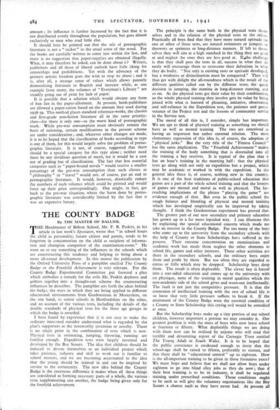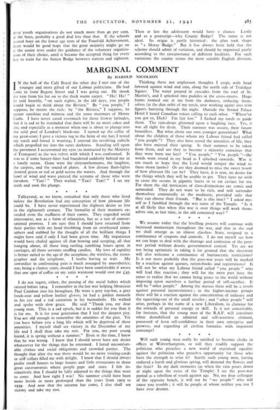THE COUNTY BADGE •
By THE MASTER OF BALLIOL •
THE Headmaster of Bolton School, Mr. F. R. Poskitt, in his article in last week's Spectator, wrote that " in school hours the child as personality, future citizen and parent, tends to be forgotten in concentration on the child as recipient of informa- tion and champion competitor of the examination-room." He went on to say something of the influences in the schools which are counteracting this tendency and helping to bring about a more all-round development. In this matter the publication by the Oxford University Press of a pamphlet entitled The County Badge or the Fourfold Achievement is very relevant. For the County Badge Experimental Committee put forward a plan which embodies a remedy for the evils Mr. Poskitt deplores and gathers together into a thought-out scheme the counteracting influences he describes. The pamphlet sets forth the ideas behind the badge, the ways in which they are being applied in different educational environments from Gordonstoun in Morayshire, on the one hand, to senior schools in Hertfordshire on the other, and an account of the various tests, including the details of the double standards of physical tests for the three age groups in which the badge is awarded.
I have found by experience that it is not easy to make the ordinary interested outsider understand what is regarded by the plan's supporters as the noteworthy invention or novelty. There is no single point in the combination of tests which is new. Physical tests in swimming, jumping, throwing, running are familiar enough. Expedition tests were largely invented and developed by the Boy Scouts. The idea that children should be induced to devote themselves to an individual project which takes patience, industry and skill to work out is familiar to school masters, and we are becoming accustomed to the idea that the young should be trained in and can be inspired by service to the community. The new idea behind the County Badge is the enormous difference it makes when all these things are considered as forming necessary parts of a whole, the various tests supplementing one another, the badge being given only for the fourfold achievement. The principle is the same both in the physical tests them_ selves and in the relation of the physical tests to the others.
Practically all boys find that they have more natural aptitude for one or other of these tests, are natural swimmers or jumpers or throwers or sprinters or long-distance runners. If left to them.
selves they will aim at a high standard in the thing they are good at and neglect the ones they are less good at. If gibe challenge is that they shall pass the tests in all, success in what they do easily will encourage them to overcome their defeatism in what they do badly. " Not only is existing taste or aptitude developed, but a weakness or disinclination must be conquered." They will
thus get with delight the all-roundness which is the result of the different qualities called out by the different tests; the quick decision in jumping, the stamina in long-distance running, and so on. As the physical tests get their value by their combination, so the whole physical training they involve gets its value by being joined with what is learned of planning, initiative, observation and self-reliance in the Expedition test, the patience and perse- verance of the Project test and the lessons of community service in the Service test. .
The moral of all this is, I consider, simple but important. We are apt to think of physical training as something we should
have as well as mental training. The two are conceived as having an important but rather external relation. The most elementary expression of this idea is, of course, the adoption of " physical jerks." But the very title of the " Fitness Council " has the same implication. The " Fourfold Achievement" makes the training of the body something that is dovetailed into all the training a boy receives. It is typical of the plan that it has an hour's training in the morning half : that the physical tests go along with not only an expedition but a project, which may be academic or worked in with the expedition. In the general idea there is, of course, nothing new in this country. It is one of the best traditions of public-school education that games are a part of the whole school training and that the lessons of games are mental and moral as well as physical. The far- reaching implications of the phrase " playing the game " are evidence enough of that. But even in the public school the rough balance and blending of physical and mental training which has developed empirically can be improved by taking thought. I think the Gordonstoun experiment has proved that.
The greater part of our new secondary and primary education has grown up in a far more lopsided way. I can illustrate this by explaining the special educational concern which made me take an interest in the County Badge. Far too many of the boys who come up to the university from the secondary schools with the help of County or State Scholarships have suffered in the process. Their extreme concentration on examinations and academic work has made them neglect the other elements in school life, games and other interests. These other activities are there in the secondary schools, and the ordinary boys enjoy them and profit by them. But too often they are regarded as extras or frills which may be dropped. Scholarship boys drop them. The result is often deplorable. The clever boy is forced into a one-sided education and comes up to the university with no physique, none of the training in moral qualities which the non-academic side of the school gives and worn-out intellectually. The fault is not just the competitive pressure. It is that the connexion of intellectual training with the rest of school life is so loose that very little pressure suffices to break it. If the attainment of the County Badge were the essential condition of a County or State Scholarship this crying evil would be remedied at once.
But the Scholarship boys make up a tiny portion of our school children, however important a portion we may consider it. Our greatest problem is with the mass of boys who now leave school at fourteen or fifteen. What deplorable things we are doing with them now can be realised by anyone who will read that terrible and devastating report of the Carnegie Trust entitled The Young Adult in South Wales. It is to be hoped that the public conscience is awakened enough to insist that the school-age shall be raised to fifteen, preferably to sixteen, and that there shall be " educational control " up to eighteen. How is•the all-important training to be given in these formative years? We must hope and believe that we shall not allow boys under eighteen to go into blind alley jobs as they do now ; that if their best training is to be in industry, it shall be regulated training under prescribed conditions. Those conditions ought to be such as will give .the voluntary organisations like the Boy Scouts a chance such as they have never had. At present all these' youth organisations do not touch more than 4o per cent. of the boys, probably a good deal less than that. If the schools started boys on the lower age tests of the Fourfold Achievement, there would be good hope that the great majority might go on to the senior tests under the guidance of the voluntary organisa- tions of their choice, until it became the accepted thing for every boy to train for the Senior Badge between sixteen and eighteen. Then at last the adolescent would have a chance. Lastly and as a postscript—why County Badge? The name is not ideal. Its origin is partly historical : the plan took shape as " a Moray -Badge." But it has always been held that the scheme should admit of variation, and should be organised partly .according to the circumstance of different localities. For such variations the county seems the most suitable English division.



























 Previous page
Previous page